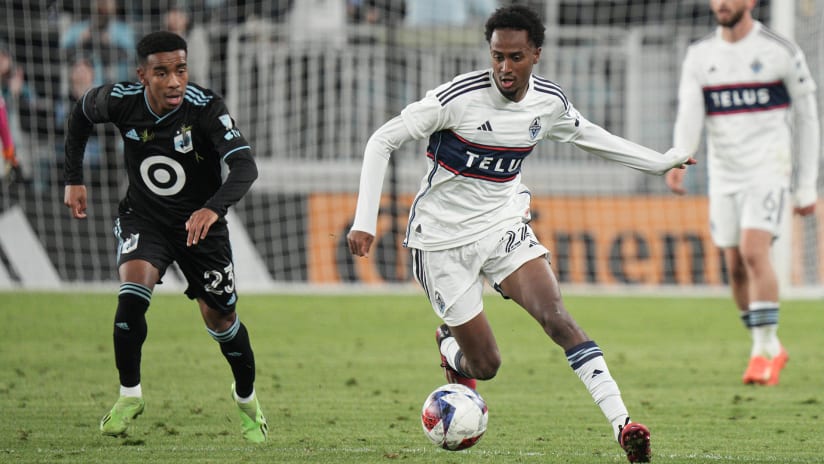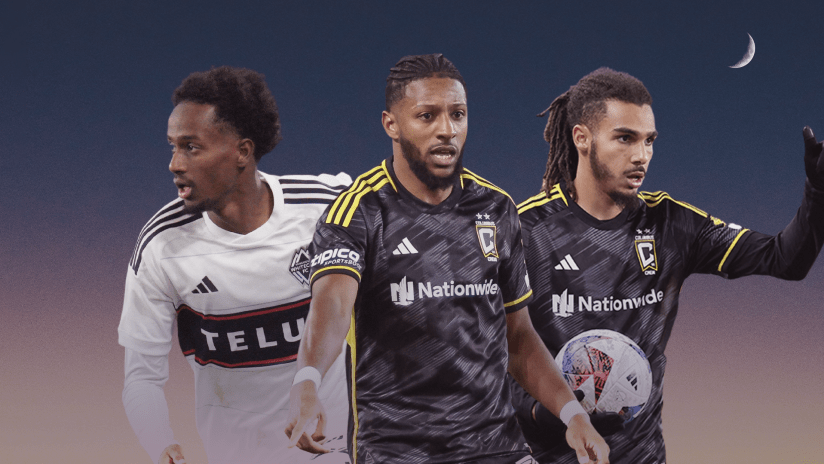It was a fleeting pause, shorter than most stoppages for injuries or video reviews – comparable to the hydration breaks commonly instituted in hot weather conditions. But it meant the world to Mo Farsi and Steven Moreira.
When the ball slipped across the endline for a Real Salt Lake goal kick 18 minutes into the match at Lower.com Field last Saturday, referee Rubiel Vazquez gave an extra blow of his whistle and gestured to the sideline. While most of their Columbus Crew teammates and RSL counterparts swigged water, Farsi and Moreira consumed something more substantial, starting with a handful of dates, as recommended by the Prophet Muhammad himself.
The sun had set in central Ohio, and as practicing Muslims, the duo could finally break sawm, the daytime fast observed throughout the month of Ramadan, a time of prayer and reflection that ranks among the religion’s most revered traditions. While players around the world in such situations have grown accustomed to waiting until halftime for that sustenance, this year MLS and PRO (Professional Referee Organization) officials quietly made space for an in-game moment like this across the league.
“'OK, it’s happening for real,’” Farsi remembered thinking when discussing the topic with media on Thursday. “'They blew the whistle and stopped the game, and I’m eating right now. Everybody stopped to let me and Steven eat.’ It was very appreciated and very respectful, so I thank everyone for that.
“To see people making these initiatives to let us feel that we are at home and we are accepted, whatever religion, wherever you are from,” added the Canadian fullback of Algerian descent, “that’s beautiful.”
Up in the players’ suite, Kyla Cross, the Crew’s team nutritionist, was moved as she looked on. On the one hand, the personalized diet, rest and hydration plans she compiles for Moreira and Farsi aren’t dramatically different from what she provides to every other member of the roster.
Where most players find their game-time snacks in their lockers, it’s an easy customization for her to pack two shoe bags with pitted dates, sports gels, fruit gummies and bananas ready for quick deployment from the Crew bench.
Optimizing worship and performance
But to witness Farsi and Moreira make that their iftar meal, carrying on a sacred tradition dating back 14 centuries, as they performed at a high level for one of MLS’ most in-form teams despite no food or water for the previous 13 hours? That felt special.
“The amount of fuel and hydration that they actually need during a day and during a game, it's a lot,” Cross told MLSsoccer.com. “That these athletes are able to compete at that highest level and still be successful, and make an impact on the game – which, Mo and Steven have had a couple of great past few games – that they're able to still do that, it is kind of mind-blowing.
“This is something that is so challenging, and the fact that they're able to do that, and the fact that the league was now able to recognize that and give those athletes that respect and that time is – there's really no words for it.”
Experts like Cross have made it easier for professional players to observe Ramadan, which runs until April 20 this year, without compromising performance. They can use cutting-edge technology to provide guidance on when to wake up for their suhoor, the pre-dawn meal that will power them through the day, what foods to feature in it, and how best to fit in a third meal before bedtime to help with carbohydrate loading. Columbus, for example, use an app called Teamworks to send reminders and share information.
“Basic recommendations are four hours before a game, soccer players should get four grams of carbs per kilo of body weight in a meal,” explained Cross. “If it's a couple of hours before, then it's two grams per kilo, and then an hour before is one gram per kilo of body weight. Most athletes are able to load their carbohydrate stores in their muscle and have some carbohydrates floating around in your bloodstream, and we also store some in our liver as well.
“So you're able to really, ‘super-compensate’ is the word, by eating carbs, and higher carbs the night before a game and the day of the game. So that's ideally what most athletes are doing to prepare, whereas these guys are only able to do that in the morning. So their muscle [stores] and their blood sugar at the time is not as high as some of the other athletes.”

That makes the league’s clearance of what’s been dubbed “drinks breaks” at sunset during match play so valuable. It also reflects a growing awareness that many of those observing in MLS appreciate.
“Honestly, as ironic as it sounds,” Vancouver Whitecaps FC wingback Ali Ahmed told MLSsoccer.com on Thursday, “I find that for the first year – last year and a bit of this year – I've actually had some of my best performances while fasting during this month.
“Obviously it does pose a physical challenge, but the team here has been super duper accommodating, whether it's getting the team nutritionist to organize things with me on the road, or even at home. And even now, you see the league is deciding to have a stoppage and recognize the fasting players. So that is big for me – it shows a big, big sign of respect from the league.”
Promoted from Vancouver’s MLS NEXT Pro squad in November, Ahmed earned his first career MLS start vs. CF Montréal last weekend and notched a goal and an assist in the 5-0 'Caps rout. The Toronto native’s performance underlined a deeper point: Ramadan can raise the ceiling for performance, not lower it.
“It's been pretty smooth this year, considering the Whitecaps and the league also have been flexible with me in helping me out for my times, when I need to break my fast,” said Whitecaps FC 2 defender Elage Bah, who did so during a drinks break in his team’s MLS NEXT Pro match at LAFC2 on Sunday.
“I've been breaking my fast in the first half. So I can give my full effort for like, maybe 25 minutes or however long I need to do that. And then after the 25 minutes, it's time to eat, so time to break my fast. It's been pretty easygoing, honestly. It hasn't been that hard.”
Noted Farsi: “Earlier in my career, I had to do it all by myself and plan it myself to find what I need to eat to have energy. But now I have all of the tools around me, so it’s very helpful.”
Ahmed has found value in sticking to a steady routine. After a brief adaptation curve at the start of Ramadan, his body acclimated quickly to a big predawn suhoor meal, accompanied by large volumes of water and electrolytes, followed by a return to sleep before training with occasional afternoon naps sprinkled in.
“That's one of the keys, to make sure you get a proper organized schedule going for yourself,” he said. “After a week or two, once you knock down that schedule you set for yourself, everything becomes definitely 10 times easier. I’m on day 15 now, I believe, and I can tell you, it's going way easier than day one.
“I'm not really too focused on the fasting part. I feel when I'm in the game, I'm locked in. Yeah, I might show some signs of fatigue, I just feel like I'm more mentally locked in. So I feel really good on the pitch.”

Solidarity in faith
Jeff Agoos, MLS Senior Vice President, Competition and Medical Administration, points out that referees, as well as players, are observing Ramadan, and after extensive consultation across PRO, the league and its members, accommodations for those fasting was a common-sense decision.
“MLS is the most internationally diverse sports league in the world, and we're committed to providing an inclusive environment for everyone,” said Agoos, who noted that all players and refs are free to take in food or drinks during the breaks. “We wanted to be as proactive as we could to meet the needs of our players during a very important time in their lives, and important to our clubs as well.”
There’s no escaping the marked contrast to policies elsewhere. In France this week, Nantes manager Antoine Kombouare dropped Jaouen Hadjam from his starting lineup after the Algerian defender declined to break his Ramadan fast on gameday, amid reports that federation officials had explicitly warned clubs not to pause matches for breaking Ramadan fasts despite large numbers of observant players across the league.
“To see something like that, it's super sad,” said Ahmed of Hadjam’s situation. “I feel like the way they came about it was definitely disrespectful. … I was telling one of my guys here, I'm very thankful that the case is not like that over here, and they're very open and respectful. You know, it goes a long way.”
As rapidly as sports science is advancing, human performance retains many intangible elements. This month offers a reminder that athletes tend to do their best work in holistic environments that recognize their output on the field can’t be divorced from their lives off it.
“I know it may sound surprising, but to be honest, I feel whenever it's Ramadan and I'm playing, I feel better. I feel stronger and more fit, which is a good thing. It doesn't really affect me negatively,” Ahmed’s 'Caps teammate Kamron Habibullah told MLSsoccer.com.
“At the end of the day, it's our religion and that comes first for us,” he added. “We're obeying God, which is the one who gave us what we have and made us who we are today, right? And I think this month is for us a month of lots of blessings, and months where we believe that God comes to us with a lot of mercy, and we have to obey Him and do as much as we can in this month to be the best Muslim possible.”
The homegrown striker has scored or assisted on all three of Whitecaps 2’s goals in their first two matches of the MLS NEXT Pro campaign, adding further weight to the idea that the holy month can actually provide a boost.
“It's kind of like a reflecting month that shows us how fortunate and thankful we really should be,” said Habibullah, whose family emigrated from Uzbekistan to British Columbia when he was a young child. “Like Ali had a great game and when he scored, he went down and thanked God. So I think fasting does make it tough at times, but at the end of the day, I think that's also why I feel stronger. Because in your mind, you're doing it for God. So spiritually it gives you that strength and that energy to keep fighting and to keep going.”










